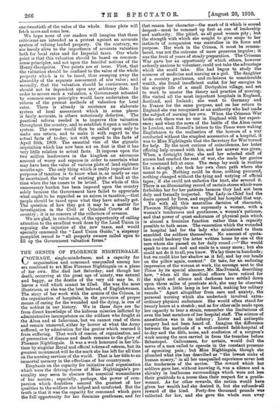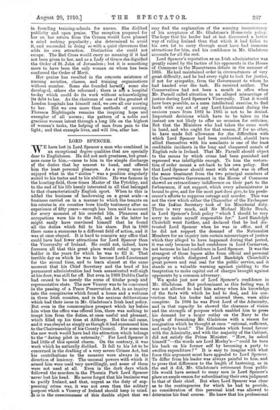THE GENIUS OF FLORENCE NIGHTINGALE.
COURAGE, single-mindedness, and a capacity for organisation and command unequalled among her sex combined to set Miss Florence Nightingale on a plane of her own. She died last Saturday, and though her death, occurring at the great age of ninety, was natural and happy, as the deaths of the very old may be, it leaves a void which cannot be filled. She was the most illustrious, as she was the best beloved, of Englishwomen. The story of her work with the armies of the Crimea, in the organisation of hospitals, in the provision of proper means of caring for the wounded and the dying, is one of the noblest in our history. We in these days are far from direct knowledge of the hideous miseries inflicted by administrative incompetence on the soldiers who fought at the Alma and at Inkerman, but we cannot read of them and remain unmoved, either by horror at what the Army suffered, or by admiration for the genius which rescued it from suffering. That work of rescue, of organisation, and of prevention of disease and death remains to the glory of Florence Nightingale. It was a work honoured in her life- time by singular Royal and official tokens of esteem, but its greatest monument will be the mark she has left for all time on the nursing services of the world. That is her title to an immortal memory in the affections of her countrymen.
Emphasis on the capacity for initiative and organisation which were the driving-forces of Miss Nightingale's per- sonality may seem to obscure the essential womanliness of her nature ; especially, perhaps, the power of com- passion which doubtless seemed the greatest of her qualities to the soldiers she helped and comforted. But the truth is that it was the capacity for command which gave the full opportunity for her feminine gentleness, and for that reason her character—the mark of it which is scored deepest—must be summed up first as one of leadership and authority. She pitied, as all good women pity ; but the strength with which she sought to give scope to her instincts of compassion was masculine in its force and purpose. Her work in the Crimea, it must be remem- bered, was not the outcome of mere generous impulse ; it was the fruit of years of steady preparation. The Crimean War gave her an opportunity of which others, however ardently anxious to volunteer, could not take the advantage which she could take. She had begun to study the sciences of medicine and nursing as a girl. The daughter of a country gentleman, and co-heiress to considerable wealth, she found insufficient outlet for her energies in the simple life of a small Derbyshire village, and set to work to master the theory and practice of nursing. She visited all the most important hospitals in England, Scotland, and Ireland ; she went to Germany and to France for the same purpose, and on her return to England she was recognised as an authority who had made the subject of nursing her own. When the Crimean War broke out there was no one in England with her experi- ence; and when the news of the battle of the Alma came to London, and Russell's letters to the Times were waking Englishmen to the realisation of the horrors of a war conducted without the simplest accessories of a hospital, it was to Miss Nightingale that the Secretary for War turned for help. By the most curious of coincidences, her letter offering help crossed with his, and her answer was given. When, a fortnight later, she and her selected staff of nurses had reached the seat of war, she made her genius for command felt at once. The camp lay sunk in routine like a slough ; she took her own clean path where she meant to go. Nothing could be done, nothing procured, nothing changed without the tying and untying of official tapes ; if she could not unfasten the knot, she severed it. There is an illuminating record of certain stores whiclrwere forbidden her for her patients because they had not been duly and formally inspected. The Lady-in-Chief had the doors opened by force, and supplied her hospital that way.
Yet with all this masculine decision of character, Florence Nightingale was supremely a woman, with a woman's tenderness and gentleness, a woman's patience, and that power of quiet endurance of physical pain which is almost a feminine function rather than a capacity possible to both sexes. The veneration which the wounded in hospital had for the lady who ministered to them ennobled the soldiers themselves. No amount of quota- tion could hackney the letter written home by one of the men whom she passed on her daily round. :—" She would speak to one and nod and smile to a many more ; but she could not do it to all, you know. We lay there in hundreds ; but we could kiss her shadow as it fell, and lay our heads on the pillow again, content." Or take, for an enduring impression of the woman at work, the message sent to the Times by its special almoner, Mr. MacDonald, describing how, " when all the medical officers have retired for the night and silence and darkness have settled down upon those miles of prostrate sick, she may be observed alone, with a little lamp in her hand, making her solitary rounds." Apart altogether from care and anxiety, the personal nursing which she undertook involved extra- ordinary physical endurance. She would often stand for twenty hours at a stretch ; and as for other calls made upon her capacity to bear a strain, remember the limitations of even the best members of her hospital staff. The science of anaesthetics was in its infancy ; Lister and antiseptic surgery had not been heard of. Imagine the difference between the methods of a well-ordered field-hospital of to-day and the filth, noise, and confusion of a surgeon's work among the men carried in from the trenches before Sebastopol. Callousness, for certain, would dull the nerve of a man called to operate in the constant presence of agonising pain ; but Miss Nightingale, though she plumbed what she has described as " the lowest sinks of human misery," in all her unequalled experience never lost the tenderness of the novice. The reward which her soldiers gave her, without knowing it, was a silence and a chivalry in loathsome surroundings which were not less their gratitude to a nurse than their respect for a gentle- woman. As for other rewards, the nation would have given her wealth had she desired it, but she refusede all reward of the kind. Forty-five thousand pounds was collected for her, and she gave the whole sum away in founding training-schools for nurses. She disliked publicity and open praise. The reception prepared for her on her return from the Crimea would have pleased a mind seeking popularity ; she determined to avoid it, and succeeded in doing so with a quiet cleverness that adds its own attraction. Distinction she could not escape. The Red Cross would carry no meaning if it had not been given to her, and as a, Lady of Grace she dignified the Order of St. John of Jerusalem ; but it is something more to have been the only woman on whom has been conferred the Order of Merit.
Her genius has resulted in the concrete existence of nursing societies, classes, and training organisations -without number. Some she founded herself ; some she developed, others she reformed ; there is ngt a hospital to-day which could do its work without acknowledging its debt to her. As the chairman of one of the greatest of London hospitals has himself said, we owe all our nursing to her. But we owe more than methods of nursing. 'Florence Nightingale remains the inspiring hope and exemplar of all nurses ; the pattern of a noble and gracious woman intent through a long life on the highest of woman's tasks, the helping of man from pain to the -light; and that example lives, and will live, after her.







































 Previous page
Previous page